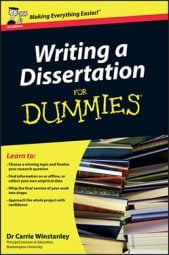There are many different was to construct your arguments and present a logical dissertation. Degree programmes, fields of study, courses, modules and tutors vary with their attitudes to the use of the personal pronoun (I) in academic work. In some types of research, identifying yourself as a researcher and using ‘I’ is often absolutely essential, as your personal perspective is central to your argument. In other cases however, mentioning your own view using ‘I’ is considered completely wrong.
Regardless of your supervisor’s view about the relevance of personal experience and the use of the personal pronoun, your dissertation must present your argument, your research and your views in relation to the research question you've chosen.
You can express your view without using the personal pronoun in a number of ways and to a lesser or greater degree, depending upon the emphasis you want to give to the point you're making. You can, for example, present a positive view of a particular argument through threading quotations together and using language that shows your favourable view.
Ensure that you use the conventions required by your course concerning the personal pronoun and how far you should or should not infuse your personal opinion across your dissertation.

